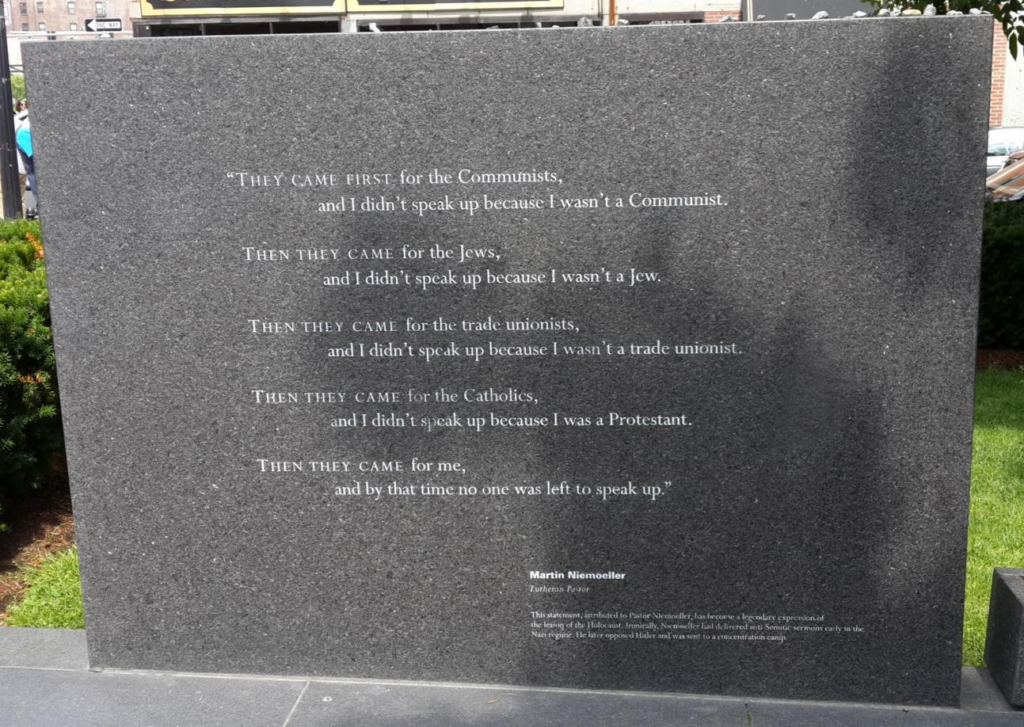As I read Sara Ahmed’s article, the first thought that came to mind was from a poem.

the German Lutheran pastor Martin Niemöller (1892–1984). [1]
It has been translated into several languages, of which the Chinese version I read is:
“起初他们追杀共产主义者,
我不是共产主义者,我不说话.
接着他们追杀犹太人,
我不是犹太人,我不说话.
此后他们追杀工会成员,
我不是工会成员,我继续不说话.
再后来他们追杀天主教徒,
我不是天主教徒,我还是不说话.
最后,他们奔我而来,
那时再也没有人站出来为我说话.
——马丁·尼莫拉牧师 1945 年 ” [1]
The original text is:
“ They came first for the Communists,
and I didn’t speak up because I wasn’t a Communist.
Then they came for the Jews,
and I didn’t speak up because I wasn’t a Jew.
Then they came for the trade unionists,
and I didn’t speak up because I wasn’t a trade unionist.
Then they came for the Catholics,
and I didn’t speak up because I was a Protestant.
Then they came for me –
and by that time no one was left to speak up.
——Pastor Martin Niemöller 1945 ” [2]
This poem was written by the poet in his later years during his confession, when he simply wanted to speak out about his wrongdoings back then. But later generations carved it on the inscription not only because of the wrongdoings but because of the poem’s profound meaning.
In the chapter “on being stop” of Sara Ahmed’s book there is a story: A junior female scholar of color was warned by a senior professor: “You are a young scholar, and if you do this now, you will be known as a complainer, so let it go.” She was advised to “let go” so as not to be known as a “grouchy person” or “someone with a grievance”. This is because people in academia believe that not complaining is a virtue, and that those who offend this virtue will be forever ostracized from the circle. Academic circles do not tolerate complainers, so many scholars have no choice but to hold their tongue when they suffer injustice. This example shows us that the pressure of public opinion and circumstances can cause complainers to eventually choose silence. Sara Ahmed elaborates on this point in her book, and it is the reason for so many wrongdoings by Pastor Martin Niemöller, moreover, the meaning behind this poem.
This poem seems to me that it sums up very profoundly the dialectical relationship between the individual and the collective in society. And demonstrates a common phenomenon: Many of us dodge and dodge, choosing to be silent or to be silenced when making choices. By choosing to step back, we appear to have made a choice, but in fact, we cede the right to choose.We must choose to stand forward. Only then will there be truth and the things of the world will come to fruition.
On the contrary, the reasons why this is becoming more and more common can often be interpreted in the context of different national political contexts and the social state we live in. In Sara Ahmed’s article, it is also mentioned several times that complainers end up “silenced” due to various circumstances. We are in a state where the more we speak up and the more we ponder, the more silent we become. Our hearts still believe in the world, our hearts want to be a voice for ourselves and a voice for those around us. But when what we support will eventually be distorted to prove that it is immoral or unjust, our voice is like a sharp knife stabbed at the so-called righteousness and justice. Under the pressure of public opinion and the environment, will this sharpknife, which seems to be in our hands, also pierce the most vulnerable part of ourselves. I can’t help but begin to wonder this.
Endnotes:
[1] Wikipedia contributors. “起初他們…” 维基百科, 自由的百科全书, https://zh.wikipedia.org/w/index.php?title=%E8%B5%B7%E5%88%9D%E4%BB%9 6%E5%80%91%E2%80%A6%E2%80%A6&oldid=64402682 (accessed February 20, 2021).
[2] Wikipedia contributors, “First they came …” Wikipedia, The Free Encyclopedia, https://en.wikipedia.org/w/index.php?title=First_they_came_…&oldid= 1059945909 (accessed January 14, 2022).
Captions:
Ill. 1: Martin Niemoeller (Life time: 14 January 1892 – 6 March 1984), “First they came…”, 1950s. This is the “First they came…” poem attributed to Martin Niemoeller at the Holocaust memorial in Boston MA, USA
Credits:
Ill. 1: Copyright expired because the work was published without a copyright notice and/or without the necessary copyright registration.